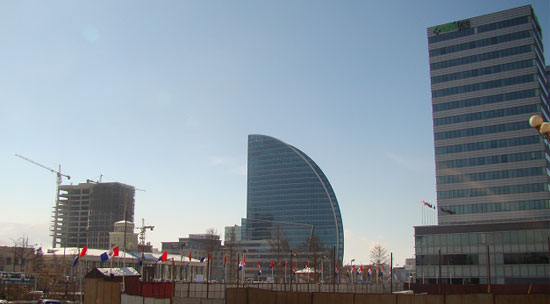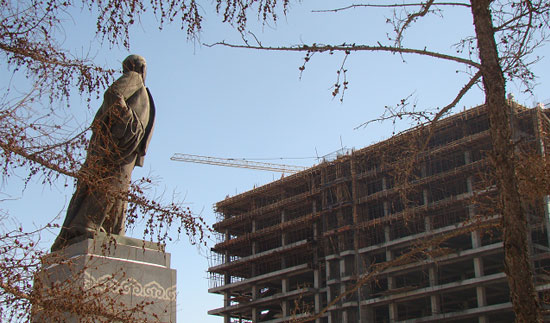China Woos Mongolia as Australia of North Asia

Ulaan Baatar is getting a skyscraper make-over as Chinese and foreign investment pours in.
Op-Ed Commentary: Chris Devonshire-Ellis
ULAAN BAATAR, Mar. 2 – China has agreed to provide a soft loan of US$300 million to Mongolia to develop a border free trade zone, along with other major trade and investment projects slated to take place in bilateral trade between the two countries. China’s Foreign Minister Yang Jiechi visited Ulaan Baatar last week to discuss bilateral trade and to seek access and participation in Mongolia’s huge mineral reserves. A new Chinese Ambassador to Mongolia, Wang Xiaolong, has also just been appointed as the two nations look to develop economic ties.
Bilateral trade between the two is currently at US$3.3 billion, however this is expected to increase significantly over the next few years as the economic bonanza promised by Mongolia’s massive mineral wealth starts to materialize. Investors are certainly straining at the leash to get in.
With China already the world’s largest consumer of coal, Mongolia’s massive reserves are finding a ready market. On top of that, Mongolia has significant deposits of gold, copper, molybdenum, tungsten, nickel, zinc, wolfram, fluorspar, tin, silver, various minerals and rare earths. Furthermore, Mongolia is reputed to have significant reserves of oil and natural gas. This was apparently recognized by Stalin, but due to Soviet incompetence never actually realized. “Stalin’s Lost Oil” may yet give another boost to an already rich nation finding itself suddenly awash in mineral wealth.
The world’s largest coal deposit is in Mongolia, the country has the world’s largest reserves of copper, and is the second largest producer of rare earths. Given China’s recent decision to place restrictions upon the exports of its own rare earths, Japanese and U.S. businesses are bypassing China and going directly to this alternative source.
As newfound wealth starts to trickle down, Mongolian consumer patterns are already changing. In Ulaan Baatar, the capital city now home to 50 percent of the nation’s population, opportunities to spend have significantly moved up market. Where there was once just a Soviet-era State Department Store selling boots and essentials, there is a swanky, modern store full of the latest iPads and gadgets, while brands such as Louis Vuitton, Chanel, Salvatore Ferragamo and Cartier have already opened stores in the flagship Central Tower on Sukhbataar Square, Mongolia’s equivalent of Beijing’s Tiananmen.
Mongolia has arrived, and is now one of the 50 countries globally dependent upon natural resources to stimulate growth and development. As much is based on mining and exploration, there is little wonder that the entire country is being compared to Australia, another economy largely dependent on natural resources.
How this development is being managed is the cause of much debate and I will be participating in such discussions at the Mongolian Economic Forum being held this week in Ulaan Baatar. For updates on this, and for comments on the sessions concerning the development of Mongolia and the opportunities for foreign investors, please see our sister web site, 2point6billion.com on which these articles will be published from tomorrow (March 4, 2011).
Chris Devonshire-Ellis is the principal of Dezan Shira & Associates, Asia’s largest independent foreign direct consultancy practice with 17 offices around Asia. The firm specializes in foreign direct investment due diligence, investment law, tax and related matters. He is also the Vice Chairman of the business advisory council for the Greater Tumen Initiative, a UNDP body responsible for North China, Mongolia, Eastern Russia, North Korea, and South Korea with Japan as an observer nation. Chris may be contacted at chris@dezshira.com for advice about investing in the region.
Chris will be hosting a Mongolia Investment Forum at the Capital Club in Beijing on Wednesday, March 23, 2011. This will detail investment opportunities and the legal/tax regulatory environment in Mongolia. For further information and to RSVP please click here.

Lenin Looks on as Mongolian democratic redevelopment gathers pace.
Related Reading
Governance Key in Unlocking Mongolia’s Massive Wealth
China Woos Mongolia as the Australia of North Asia
What if the Wolf Snarls? Mongolia’s Macro-Economic Risks
Ten Things We’ve Learned about Mongolian Democracy (and China)
Mongolia GDP Per Cap Set to Rise Faster than China
Future Bright for Foreign Investment in Mongolia
Trade Opportunities along China’s Frontiers
 Mongolia Expat
Mongolia Expat
Mongolia travel, culture and countryside, complimentary magazines, books and photo gallery. New magazine issue “Serious Chill” online now.
- Previous Article What Constitutes a “China Practice”?
- Next Article An Introduction to Industrial Parks in Zhejiang Province









